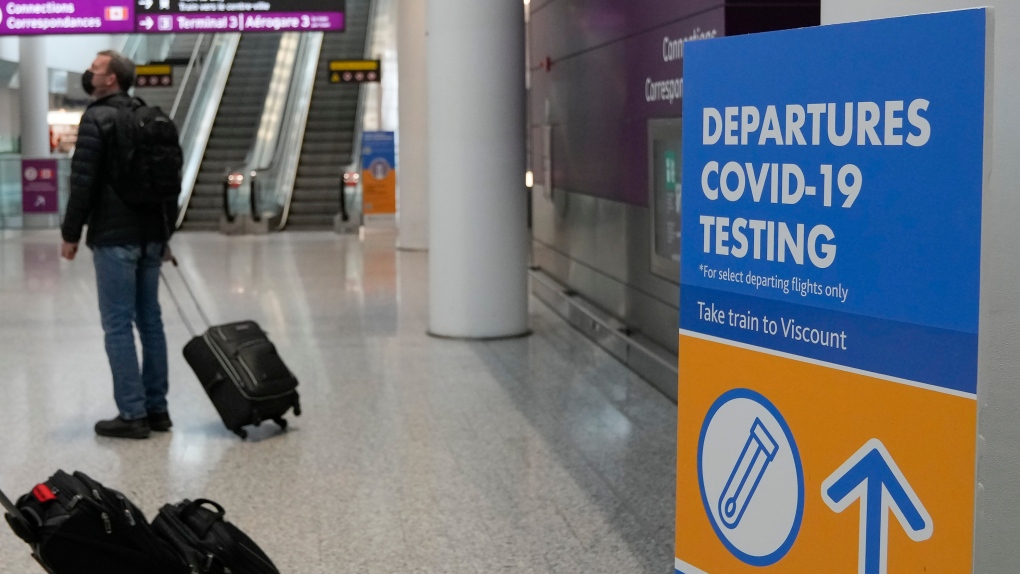Airlines and Pearson ask government to drop mandatory arrival testing requirement
 People travel at Pearson International Airport during the COVID-19 pandemic in Toronto, Friday, Dec. 3, 2021. THE CANADIAN PRESS/Nathan Denette
People travel at Pearson International Airport during the COVID-19 pandemic in Toronto, Friday, Dec. 3, 2021. THE CANADIAN PRESS/Nathan Denette
Canada's largest airlines and the country's busiest airport are asking the federal government to drop its rule requiring mandatory arrivals testing for COVID-19.
In a letter to the federal and Ontario governments, Air Canada, WestJet and Toronto Pearson are calling for a shift of the testing capacity from the airports to the community.
As COVID-19 cases have surged in recent weeks, many provinces have decided to restrict molecular PCR testing to those at a higher risk of being hospitalized from COVID-19 or who are in settings where the virus could spread more quickly.
Travellers coming to Canada need to have a pre-arrival negative molecular test result for COVID-19. Once they arrive, those coming from any country other than the U.S. are tested again and must isolate until they get their results. Those coming from the United States are tested randomly.
The airlines and airport say testing arriving travellers isn't the best use of Canada's limited testing resources. They say the percentage of positive tests for those checked at the Canada's airports in the most recent week reported is far lower than tests in the community.
Air Canada, WestJet and Pearson want the government to revert to random arrival testing of international travellers and only require isolation for those arriving from an international location if they are exhibiting symptoms or test positive on a random test. They say those who do not have any symptoms after a negative pre-departure test before travel to Canada should not be required to isolate.
CTVNews.ca Top Stories

'A step forward': New screening criteria for sperm donors takes effect
Canadians looking to grow their families with the assistance of sperm or egg donations should soon have more options for donors as the federal health agency does away with longstanding restrictions criticized as discriminatory.
What is whooping cough and should Canadians be concerned as Europe declares outbreak?
There is currently a whooping cough epidemic in Europe, with 10 times as many cases compared to the previous two years. While an outbreak has not been declared nationwide in Canada, whooping cough is regularly detected in the country.
Ontario Provincial Police arrest 64 suspects in child sexual exploitation investigation
Ontario Provincial Police say 64 suspects are facing a combined 348 charges in connection with a series of child sexual exploitation investigations that spanned the province.
Ippei Mizuhara, ex-interpreter for baseball star Shohei Ohtani, pleads guilty in sports betting case
The former interpreter for Los Angeles Dodgers star Shohei Ohtani pleaded guilty to bank and tax fraud Wednesday in a sports betting case where prosecutors allege he stole US$16 million from the Japanese baseball player to pay off debts.
Steve Albini, legendary producer for Nirvana, the Pixies and an alternative rock pioneer, dies at 61
Steve Albini, an alternative rock pioneer and legendary producer who shaped the musical landscape through his work with Nirvana, the Pixies, PJ Harvey and more, has died. He was 61.
Pfizer agrees to settle more than 10K lawsuits over Zantac cancer risk: Bloomberg News
Pfizer has agreed to settle more than 10,000 lawsuits about cancer risks related to the now discontinued heartburn drug Zantac, Bloomberg News reported on Wednesday, citing people familiar with the deal.
U.S. presidential candidate RFK Jr. had a brain worm, has recovered, campaign says
Independent U.S. presidential candidate Robert F. Kennedy Jr. had a parasite in his head more than a decade ago, but has fully recovered, his campaign said, after the New York Times reported about the ailment.
Watch fighter jet pilots pummel fake enemy ship off coast of Philippines
The United States and Philippines held annual joint-training drills just off the Southeast Asian nation’s western coast on Wednesday. Military forces sunk a 'mock' enemy warship – the BRP Lake Caliraya, which was a decommissioned tanker made in China.
'Summer of discontent': Federal unions vow to fight new 3-day a week office mandate
Federal unions are launching legal challenges and encouraging public sector workers to file "tens of thousands" of grievances over the new mandate requiring federal workers to return to the office at least three days a week in the fall.

































